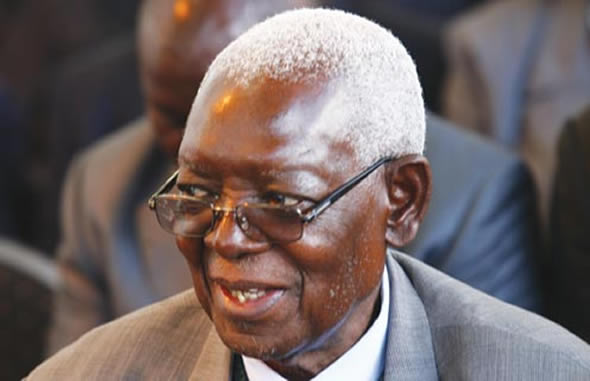By Fungi Kwaramba
HARARE – Respected Zanu PF elder, Cephas Msipa, has penned a book that could set the cat among the pigeons within government circles as it spotlights on democracy deficiencies in the country and how authorities did little as an estimated 20 000 innocent people, mainly in Matabeleland and the Midlands, were brutally killed by the Fifth Brigade in the early 80s.

The book, titled In Pursuit of Freedom and Justice — A Memoir, dismisses the official massaging of narratives on the Gukurahundi atrocities as “a moment of madness”, saying as the massacres happened over a period spanning more than five years, they cannot therefore be described as such.
Querying the reasons why the government had deployed the military in the western regions of the country then, Msipa also asks why it was “necessary for North Korea to train this army (5th Brigade)” in the first place, adding almost despairingly that “only God Knows”.
“Innocent men, women and children perished in their thousands. They were accused of either harbouring dissidents or supporting them. It turned out to be a massacre of people perceived to be PF Zapu supporters.
“The fact that the people were Ndebele-speakers was regarded as sufficient proof that they were PF Zapu supporters and therefore dissident supporters,” reads part of the book.
He also described the statement that the massacres were “a moment of madness” — which is attributed to President Robert Mugabe — as absurd, adding that three decades after Gukurahundi was launched, it still raised “more questions than answers”.
In one of the strongest condemnations of one of the darkest periods in the history of post-independent Zimbabwe, Msipa — who fondly refers to Mugabe as his muzukuru (nephew), and helped broker the unity accord of 1987 that ended hostilities between Zanu and Zapu — described the killings as “gruesome”, calling on authorities “to look into the aftermath of Gukurahundi.”
“Gukurahundi was not a day’s event or a ‘moment of madness’. It began in 1981 and continued until 1987 when the unity accord was signed.
“There were meetings at which the matter was raised in my presence, and Mugabe insisted that the matter be discussed so he could learn more about what had happened and was still happening.
“The question is why did he not know what was happening when it was in the media and many human rights organisations and churches were publicly protesting (about it),” Msipa writes.
He also claims in the book that as early as 1960, Mugabe was already keen on establishing a one party state in the country.
“Mugabe supported the idea of a one-party state back then, but he did not speak much about his personal experiences in Ghana. It was as if something had gone wrong while he was in Ghana, which he did not want to disclose,” Msipa said.
Despite the two men enjoying a decades-long friendship, Msipa was fired from Mugabe’s cabinet during the Gukurahundi era and placed under house arrest, something he says still puzzles him up to this day.
A man of steadfast principles and strong convictions, Msipa also says in the book that when Zanu split from Zapu in the early 1960s, he was allegedly approached by Mugabe to desert Nkomo, but refused.
“When the split occurred, Mugabe had approached me and asked if I would join Zanu. I told him I would not because I did not trust Ndabaningi Sithole. He then said to me, ‘I hope this will not affect our relationship’.
“Why should it?’ I replied, and indeed it in no way affected our friendship, which continues up to now. He remains my ‘Muzukuru’ and I remain his ‘Sekuru’”.
Msipa also touches on the disputed 2008 elections in his book and says it was during the presidential run-off elections where the “army was active” that he had decided to end his illustrious political career, as he had been appalled by the army’s involvement in the elections.
“At one election meeting, in chief Mazvihwa’s area in Zvishavane, I was surprised to find myself sharing a platform with army commanders.
“I kept asking myself, ‘is this the freedom we fought for?’ … it was there that I made up my mind that I would never again participate in elections where people were openly threatened and intimidated into voting for any political party,” Msipa said. Daily News






